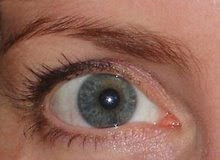One day in acting class Pamela said that she wanted us all to go home and think about why we wanted to be actors. And this would be up for discussion the following day. I didn't really think much about my answer because I anticipated this would be one of those warm and fuzzy acting exercises where we all would learn more about each other. Someone would cry, others would have sympathetic tears. We'd hug each other. We'd smoke and go for drinks. Typical actor stuff.
When the discussion began, one enthusiastic student announced he'd wanted to be an actor from the time he was a small boy when he learned that it felt good to make people laugh. We all smiled politely. "Wrong", said Pamela. We turned to stare at her. How could his answer be wrong?
Someone else tentatively put forward that she wanted to use theatre as a vehicle to promote social change. This sounded academic. It had to be what Pamela wanted. She said, "No, that's wrong."
"Because I love it?"
"Wrong."
"Because I have stories I want to tell."
"No."
"Because it's fun?"
"Wrong."
On and on like this we ventured timid thoughts, timid because it had never occurred to us that our reasons for pursuing acting could be right or wrong. Only that we each wanted ours to be the most entertaining or relatable or funny or... something.
"Wrong," said Pamela. "The only reason for you to be actor, for anyone to ever even consider being an actor, is because you have to. Because you absolutely must, because there is absolutely nothing else you could ever do."
Interesting. I looked around me. People were nodding. Some of them seemed to know what she meant. Maybe, they too, had to be actors.
Pamela's pronouncement only confirmed what I already knew, that I wasn't going to be an actor. I might act, I might enjoy acting and do it sometimes, but I wasn't going to be an actor. There was nothing in me that longed for the stage badly enough that I had to pursue it at all costs.
Maybe if someone had asked me when I was in twelfth grade, playing Molly Molloy in The Matchmaker why I wanted to be an actor I would have said that I had to be. That was when I was seventeen and my very identity was inexorably tied to the theatre, and because when I was seventeen, acting was the only thing I knew I was good at. I couldn't factor a polynomial or even, really, diagram a sentence in spite of being able to write one just fine. I couldn't figure out what the cool kids were laughing at or talking about, I didn't have the right haircut, and I didn't listen to the right music. But I could memorize a script, and I could really really deliver a performance. Without that, I would not have known who I was.
But Pamela didn't ask me that question when I was seventeen. She asked when I was twenty-three, and by then I had a better idea of who I might be outside of pretending to be someone else.
When I teach acting, I do not teach with the notion that any of my students will become actors. I teach with the idea that there are probably other teenagers who have no idea who they are and could use a little help figuring it out. We do acting games and exercises and performances, but the purpose isn't to become an actor. It's to practice real world skills in a safe place where we can pretend that we're just pretending.
*

